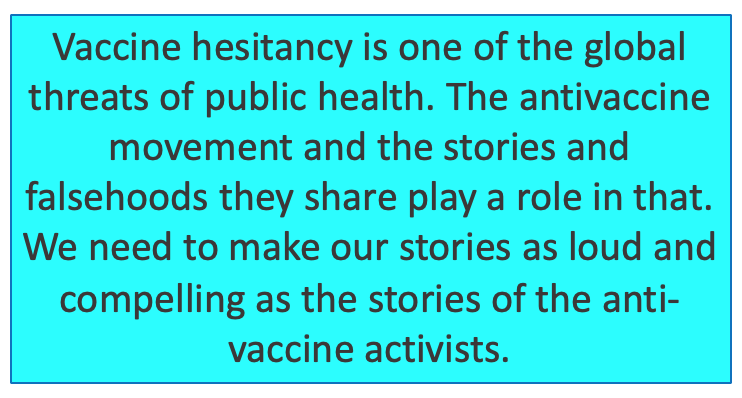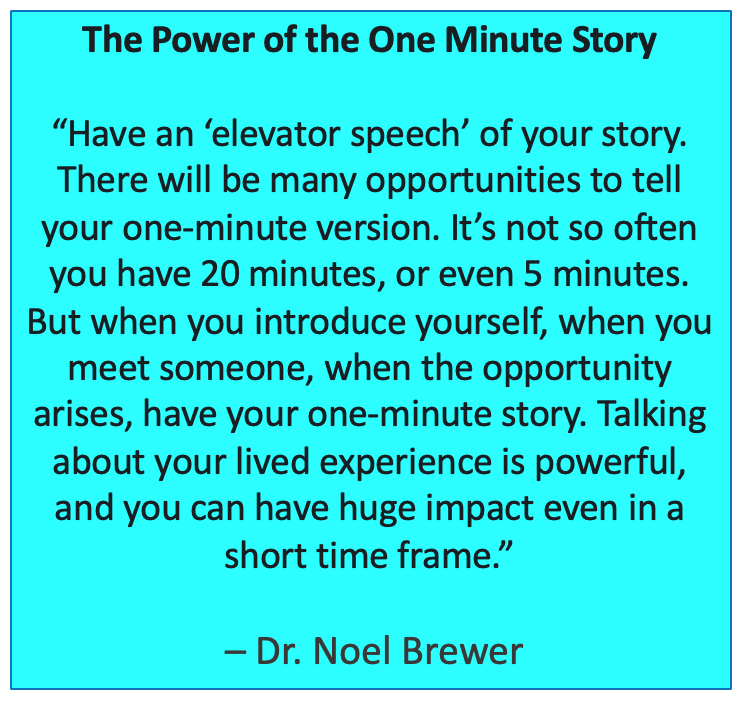Storytelling is powerful. Storytelling is compelling. In this age of social media, stories have evolved from words and pages to photos, memes and videos. Unfortunately, “anti-vaccination activists have weaponized stories and weaponized misinformation” and have used their stories to undermine the broader adoption of the HPV vaccine around the world.

Dr. Noel Brewer, chair of the National HPV Vaccination Roundtable, shares why patient stories are essential to combating the anti-vaccination movement.
“Antivaccine activists rely on story telling. We scientists come back with statistics and numbers. While our statistics and facts may be true, they have little power in this arena. We walk into this firefight with a calculator.”
“In the real world, statistics and data don’t hold power, except on pages of a medical journal. What matters is people and their lived experience. Having powerful stories cuts through to what matters.”
Cervivor stories can help fight against the anti-vaccination narrative.

The power of the story in the hands of Cervivor can be used to grow cervical cancer awareness and expand HPV vaccination.
“Vaccine hesitancy is one of the global threats of public health. Legislators and policymakers increasingly seem to think vaccination is waning. That isn’t true. It’s just that the few anti-vaccine people are so loud. They have an outsized voice that is dangerous to the public’s health and well-being.” Their voice can cause people to hesitate, rather than to move forward with HPV vaccinations for their daughters and sons.
In the U.S., HPV vaccination is in fact drifting upward – around 66% of teens have had at least a dose, if not the full course, Dr. Brewer reports. “This is a big accomplishment. But our goal at the National HPV Vaccination Roundtable is to reach 80% having all the recommended doses. This vaccine will save tens of thousands of lives. It’s remarkable that people say ‘no’ to a cancer vaccine. The antivaccine movement and the stories and falsehoods they share play a role in that.”
We have to make our stories as loud and compelling as the stories of the anti-vaccine activists.
Dr. Brewer’s Advice to Cervivors: Have an Elevator Speech
“One thing I would encourage survivors to do: have the elevator speech of your story. There will be many many opportunities to tell your one minute version. It is not so often you have 20 minutes, or even five minutes. But when you introduce yourself, when you meet someone, when the opportunity arises, have your one minute story. Have a few different one minute versions of the different parts of your story. Talking about your lived experience is powerful, and you can have huge impact even in a short time frame.”

In fact, Dr. Brewer many times shares some of the one minute Cervivor Story videos on the CervivorTV Youtube channel. He and his colleagues have shown Lisa Moore’s video hundreds of times, at meetings all around the world, to focus audiences on “what really matters” when they are discussing the HPV vaccine. Lisa lost her life to cervical cancer in 2017, but her story has lived on in a hugely impactful way. All of our stories can have this impact too.
Do you have your elevator speech?
What will you share?
Tap in to Cervivor’s videos, resources and trainings to shape your story, enhance your advocacy and use your voice to end cervical cancer.
A professor of Health Behavior at the University of North Carolina Gillings School of Global Public, Dr. Noel Brewer studies health behaviors. He examines ways to increase HPV vaccine uptake, and his research led to the development of “The Announcement Approach” to train providers to communicate more effectively about HPV vaccination and other vaccines for adolescents. Dr. Brewer chairs the National HPV Vaccination Roundtable, which brings a wide cross-section of stakeholders together to raise HPV vaccination rates and prevent HPV-related cancers.